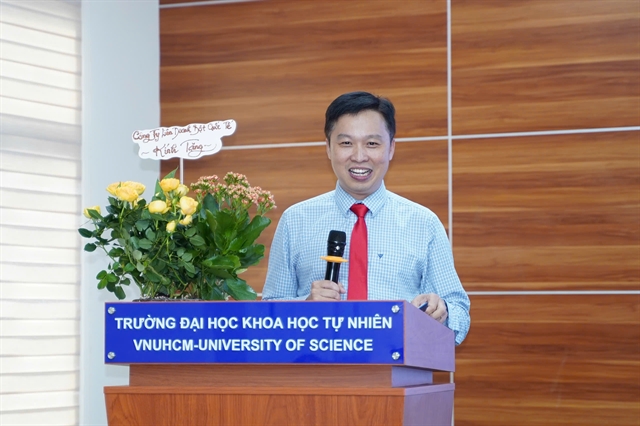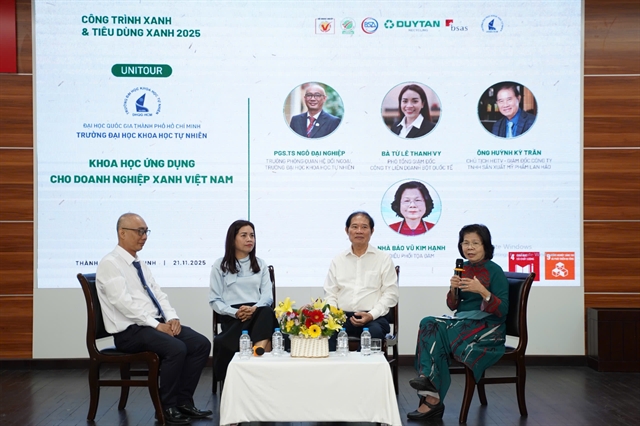 Economy
Economy


|
| MSc Văn Chí Nam, vice rector of the University of Science, Vietnam National University-HCM City, speaks at the Uni Tour event in HCM City on November 21. — Photo courtesy of the organisers |
HCM CITY — Strengthening the State–university–business linkage benefits all parties and helps accelerate the transition of Vietnamese products toward greener, more sustainable development, speakers said at the Uni Tour event on November 21 in HCM City.
The event, themed “Applied Science for Green Vietnamese Products,” was jointly organised by the High-Quality Vietnamese Goods Business Association and the University of Science (HCMUS) under Vietnam National University-HCM City.
It aims to introduce businesses’ green models to university campuses while enhancing research and development (R&D) collaboration between enterprises and educational institutions.
In her opening remarks, Vũ Kim Hạnh, chairwoman of the association, said one of the ni Tour programme seeks to link universities, the State, and enterprises, with a focus on connecting businesses with academic researchers to boost R&D activities.
“R&D activities sustain Vietnamese products in general, and the high-quality Vietnamese goods community in particular,” she said.
MSc Văn Chí Nam, vice rector of the HCMUS, praised the association’s efforts in fostering this three-party connection, noting that the initiative opens many cooperation opportunities, especially in R&D aimed at discovering new materials or optimising production processes.
He described the shift toward green standards and sustainable production as irreversible, emphasising that research institutions must “move one step ahead” to build the scientific foundation supporting enterprises.
“To meet the green transition, research and training must evolve continuously. We are building new capabilities and adjusting research models to align more closely with real-world needs,” Nam said.
He highlighted that the university is equipped with laboratories, specialists, and facilities to handle technical challenges from enterprises, particularly those related to green standards, material transitions, process optimisation, or product quality improvement.
“We see tremendous opportunities to collaborate on new material solutions and more efficient processes and is ready to listen to businesses’ needs to jointly develop the most feasible research projects.”
The university aims to support businesses in creating products that are green, market-relevant, and scalable.
He added that his university is training a new generation of students and trainees with scientific thinking, adaptability, and a strong sense of responsibility.
Business involvement in hands-on training will improve the labour market by training talent that meets industry standards, he said,
He stressed that business–university cooperation extends beyond recruitment to co-developing research topics, building internship programmes, sponsoring applied research, and commissioning technical solutions.

|
| Panelists at a panel discussion during the Uni Tour event. — Photo courtesy of the organisers |
Assoc. Prof. Dr. Ngô Đại Nghiệp, head of external relations at HCMUS, said the university prioritises lifelong learning and embeds professional ethics across its programmes.
Drawing on years of experience working with enterprises, he noted that effective collaboration must be both technically grounded and aligned with market demands.
He also noted that most university research remains at the lab scale. To turn it into commercial products, businesses need to place trust in researchers and engage from the earliest experimental stages.
From a business perspective, Từ Lê Thanh Vy, deputy general director of International Mix Joint-Venture Company (Intermix), said ongoing innovation is essential for attracting consumers.
Rising demand for “green,” safe and environmentally friendly products has pushed Intermix to proactively research and apply new, sustainability-aligned ingredients. Beyond eco-certified additives, many natural ingredients, though not labelled eco, are safe and offer excellent flavour and quality. The company is now exploring how to integrate these ingredients into its premix powder product lines.
“For packaging, the global trend is shifting toward recycled or paper-based materials. Despite higher costs, we are committed to adopting eco-friendly packaging to offer a greener experience for Mikko Hương Xưa premix powder brand,” she said.
“We hope universities can share research on green materials, sustainable packaging, or clean ingredient sources. If suitable, these findings can be applied directly to production to advance our sustainability efforts,” she added.
Dr. Huỳnh Kỳ Trân, chairman of Lan Hảo Cosmetics Production Company, emphasised that ethics are crucial in food and biotechnology.
“Consumers, particularly low-income women and workers earning only VNĐ7–10 million per month, are highly vulnerable. If businesses raise prices just to fund flashy marketing and packaging, they place an unfair burden on these customers. Professionals must recognise their limits, uphold integrity, and prioritise the community’s interests over short-term gains,” he stressed. — VNS

.jpg)


